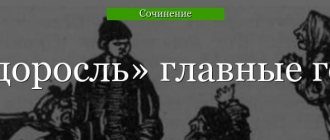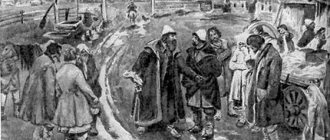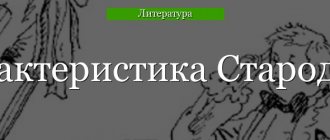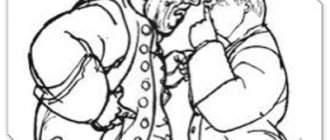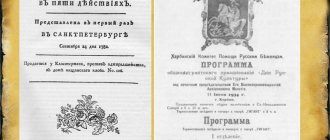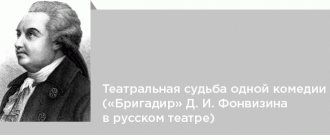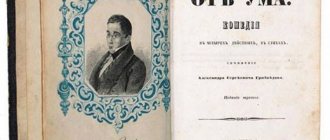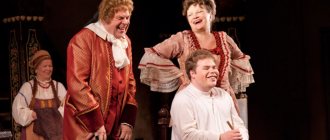The comedy “The Minor” was created by D. I. Fonvizin in 1781. The central problem of the work is the condemnation of the noble education of those times. The play contains signs of a classical style. A typical literary device is the use of telling first and last names that clearly reflect the character of the character. The title of the play reflects the essence of the decree of Peter I, which stipulated the impossibility of nobles without education to serve and marry. The relevance of the work's problems is often used when writing essays or creative works.
Main characters
Mitrofanushka | In the image of Mitrofan, the author ridicules the rudeness, ignorance and stagnation of the Russian nobility. The main character is sixteen years old, he lives with his parents. Mitrofan is the only child in the family. He is completely uneducated. Everyone only praises Mitrofanushka for his lack of desire to study. The character appears to the reader as a spoiled young man who does not respect others. He does not respect his own father, flatters and takes advantage of his mother. Detailed characteristics of Mitrofan. |
Starodum | In “The Minor,” the hero Starodum is Sophia’s uncle and guardian. His name indicates a generation of courtiers who carried out their service honestly and without currying favor with the “powers of this world.” He speaks in the words of the author. The character is characterized by sincere straightforwardness and denial of all injustice. A person with authority and power should not neglect the rights of other people - this is the main moral principle of the hero. A positive hero who acts as an exponent of the author's intention. Detailed characteristics of Starodum. |
Prostakova | Nodal negative hero. Shown as an uneducated and ignorant woman. She concentrates power in the family in her hands. The only person she has good feelings for is her son. The main characteristic of her image is an insane, even animalistic feeling of love for her son. She is sure that everything that is good for Mitrofan is beneficial, and the rest is bad. In her opinion, the way in which the desired is achieved is not particularly important, the main thing is the result. Detailed characteristics of Prostakova. |
Pravdin | A civil servant who was sent to check the true state of affairs in the Prostakov estate. A decent and honest person. He notes all the signs of arbitrariness and tyranny. The Prostakovs’ case concerns him not only as a matter of national importance. The hero wants to stop the landowner's tyranny. The truth will prevail and the estate will be confiscated from the cruel and oppressive wife. Detailed description of Pravdin. |
What is the role of minor characters in Fonvizin’s comedy “The Minor”?
Minor characters in the comedy by D.I. Fonvizin "Minor"
, which include Skotinin, Prostakov, Kuteikin, Tsyfirkin, Vralman, Eremeevna and Trishka, perform important functions, since they, in addition to participating in the plot, occupy an important place in revealing the problems raised by the author.
The image of Skotinin reveals more deeply the problem of lordly tyranny. Like Skotinin
, and his sister Mrs. Prostakova, are sure that serfs should fulfill their every whim. Skotinin talks with some pride about his “custom”, which is that “every fault is to blame.” Like Mrs. Prostakova, Skotinin takes advantage of the labor of his servants, not paying attention to their feelings and the difficulties they face. Mrs. Prostakova praises her brother for the fact that he quite cleverly collects rent from the peasants, taking even the excess from them. DI. Fonvizin points out the cruelty that is characteristic of most nobles: Skotinin is really confident that a nobleman is “free to beat a servant whenever he wants.”
The image of Skotinin is important not only for demonstrating the permissiveness of the nobles towards the serfs, but also for demonstrating an empty and meaningless existence, where there is no place for education, where the main values in life are money. Skotinin is not interested in anything but pigs. He brings no benefit to society and lives his life stupidly. Skotinin says that he “hasn’t read anything in my life,” claiming that reading is boring. Just because he wants to provide himself and his beloved pigs with a good life, he plans to marry Sophia, who inherited a large sum of money.
The image of Prostakov, the husband of Mrs. Prostakova and the father of Mitrofanushka, is of great importance. He does not allow himself to express his own opinion; in principle, he has no opinion of his own. DI. Fonvizin shows that nobles like Mrs. Prostakova are becoming convinced every day of their permissiveness and impunity, as a result of the silence of people like Prostakov
, who put up with the cruelty and immorality of other nobles and do nothing to fight injustice.
The images of teachers Mitrofanushka Kuteikin, Tsyfirkin and Vralman help in revealing the problem of education. DI. Fonvizin asks the question: what knowledge can young nobles gain if their teachers are poorly educated people? Vralman, having nothing to do with teaching, having previously worked as a coachman, constantly disrupts Mitrofanushka’s classes, doing nothing for his education, only charging the Prostakovs a fee. The comedy shows that the cruel Mitrofanushka, following the example of his own mother, becomes a more dangerous social phenomenon under the influence of such teachers, who, understanding nothing about education, were hired by Mrs. Prostakova, since the presence of teachers was considered mandatory in the noble society of that time.
The images of Eremeevna’s servants, Mitrofanushka’s nanny, and Trishka, who plays the role of a tailor during the action, are important for revealing the problems of lordly tyranny and peasant obedience. DI. Fonvizin shows that serfs are forced to endure bullying and even beatings from their masters. Eremeevna admits that she receives “five rubles a year and five slaps a day.” Trishka
forced to listen to Mrs. Prostakova’s claims, even though he is not a professional tailor. The author of the comedy feels sorry for the servants, but he also points out their guilt in the lack of justice in society, since Eremeevna, Trishka, and other servants in the Prostakovs’ house put up with lawlessness and do nothing to change their powerless situation.
Thus, with the help of images of minor characters, the author of “The Minor” paints the broadest picture of social life, revealing important and pressing problems of contemporary Russian society.
Did you like the essay? And here's another:
- Are people or morals the object of ridicule in Fonvizin’s comedy “The Minor”?
Taras Skotinin, Prostakova’s brother, is a typical representative of small feudal landowners. Having grown up in a family that was extremely hostile to enlightenment, he is distinguished by ignorance and mental retardation, although he is naturally smart.
Having heard about the taking into custody of the Prostakovs’ estate, he says: “Yes, they’ll get to me that way. Yes, and any Skotinin can fall under guardianship... I’ll get out of here as quickly as possible.” All his thoughts and interests are connected only with his barnyard. Gogol says about him: “Pigs became for him what an art gallery is for an art lover! He only shows warmth and tenderness towards his pigs. Skotinin is a ferocious serf owner, a master of “ripping off” rent from the peasants. Skotinin is greedy. Having learned that Sophia will bring her husband a fortune that will give him ten thousand in income, he is ready to destroy his rival, Mitrofan. Eremeevna, Mitrofan’s nanny, is drawn with great artistic force. Fonvizin convincingly shows what a corrupting influence serfdom had on domestic servants, how it disfigures and perverts their inherent good human qualities, develops and fosters slavish humiliation in them. Eremeevna has served Prostakov-Skotinin for forty years. She is selflessly devoted to them, slavishly attached to home, and has a highly developed sense of duty. Without sparing herself, she protects Mitrofan. When Skotinin wants to kill Mitrofan, Eremeevna, “shielding Mitrofan, going berserk and raising her fists,” as Fonvizin pointed out, shouts: “I’ll die on the spot, but I won’t give up the child. Show up, sir, just kindly show up. I’ll scratch out those thorns.” But this devotion and sense of duty acquires a distorted, slavish character in Eremeevna. She has no sense of human dignity. There is not only hatred for one’s inhuman oppressors, but even protest. Serving her tormentors, “without sparing her life,” Eremeevna lives in constant fear, trembling before her ferocious mistress. “Oh, he’s leaving him! Where should my head go? - she screams with despair and fear, seeing how Skotinin approaches Mitrofan with threats. And when Milon pushes Eremeevna away from Sofia, Eremeevna screams: “My little head is gone!” And for such selfless and faithful service, Eremeevna receives only beatings and hears only such appeals from Prostakova and Mitrofan as a beast, a dog’s daughter, an old witch, an old bastard. The fate of Eremeevna is difficult and tragic, forced to serve the monster landowners who are unable to appreciate her faithful service. The images of Mitrofan’s home teachers: Tsyfirkin, Kuteikin, Vralman are truthful and vitally convincing in the comedy. Retired soldier Tsyfirkin is a man with a number of good qualities. He is hardworking: “I don’t like to live idlely,” he says. In the city, he helps clerks “either check the meter or summarize the results,” and “teach the guys in his spare time.” (Fonvizin painted the image of Tsyfirkin with obvious sympathy. In a different light, Fonvizin gives the teacher of Russian and Church Slavonic languages Kuteikin. This is a half-educated seminarian who left the first classes of the theological seminary, “fearing the abyss of wisdom.” But he is not without cunning. Reading the Book of Hours with Mitrofan, he It is not without intent that he chooses the text: “I am a worm, not a man, a slander against men,” and he also interprets the word worm as “that is, an animal, a cattle." Like Tsyfirkin, he sympathizes with Eremeevna. But Kuteikin sharply differs from Tsyfirkin in his greed for money. Kuteikin’s language strongly emphasizes Church Slavonicisms, which he brought from the spiritual environment and theological school. The German Vralman, a rogue teacher, a man with a lackey’s soul, a former coachman of Starodum, is brought out in a satirical light in the comedy. Having lost his place as a result After Starodum left for Siberia, he became a teacher, since he could not find a job as a coachman. Naturally, such an ignorant “teacher” could not teach his student anything. He did not teach, indulging Mitrofan’s laziness and taking advantage of Prostakova’s complete ignorance.
Related materials:
- Analysis of the work by D.I. Fonvizin "Minor" - .
- Good and evil in the comedy of D.I. Fonvizin "Minor" - .
- Ideas of Russian enlightenment in the comedy “Nedorosl” - .
- Portrayal of the nobility in the comedy by D.I. Fonvizin "Minor" - .
- The image of Mirofanushka in the comedy “The Minor” -.
Essay: The role of minor characters in the play “Minor” (D.I. Fonvizin)
Minor characters in the comedy “The Minor” play an important role in creating the atmosphere. The reader understands the character of the main characters more clearly. Minor characters are necessary for a deeper and more complete understanding of the picture. Such heroes in the play are educators.
First in line is Mitrofan’s nanny, Evremeevna. She, like a second mother, constantly cares for and raises Mitrofan. Through the image of Evremeevna, humility and tolerance are shown. For forty years, during which the nanny worked hard, she received only “five rubles a year, and five slaps a day.” She is so accustomed to this house and to her way of life that she does not leave, but, on the contrary, continues to protect and protect Mitrofan. From an ordinary nanny, she turned into a slave who has no self-esteem. She herself has turned her life into slavery, and her owners are not able to competently evaluate her work. Her image evokes sympathy.
Other teachers in the comedy are shown as embodiments of ignorance and illiteracy. Let us remember who taught Mitrofan mathematics. Former soldier Pafnutich Tsyfirkin, on the one hand, loved to work and did not accept life for his own pleasure, but on the other hand, he took up a task about which he knew nothing. Tsyfirkin refused the money because he could not teach his ward basic arithmetic. He is a bad teacher, but he is a kind and honest person. This evokes respect in the eyes of good heroes.
A teacher of Russian and Church Slavonic languages, Sidorich Kuteikin taught Mitrofan literate speech. But Kuteikin himself never completed his studies at the seminary, as he asked to be exempted from studying. Kuteikin is calculating and cunning. Unlike Tsyfirkin, he is distinguished by his greed for money. Kuteikin’s speech contains Church Slavonic words that remain from his training days. He did not like Mitrofan for his stupidity and laziness.
Not without history teacher Vralman. According to him, in addition to history, he can teach minors many foreign languages. His interesting and seemingly German surname can immediately tell about his character. But the first syllable “lied” indicates his nature. In fact, Vralman is not a teacher at all, but only a coachman who worked for Pravdin for three years. Vralman got this job only because of the stupidity of the Prostakov family, who did not see him as an ordinary deceiver, but only blindly followed the fashionable trend to hire foreign teachers.
Thus, through the minor characters, the color of the entire society is shown in the play “The Minor.” Only to them did Prostakova tell the truth, which caused the reader to have a more negative attitude towards her. And Mitrofan, in imitation of his mother, constantly scolds his teachers and almost raises his hand. By an absurd accident, they ended up in this house and are forced to endure everything that happens. They suffer, but do not leave, because they have nowhere else to go.
Previous
Essays Final essay: What does war do to people?
Next
EssaysEssay: Oblomov’s crystal soul in the novel “Oblomov” (I.A. Goncharov)
Essay on the topic: The image of minor characters in Fonvizin’s comedy “Minor”
_________________________________________________________________________________________________ Composition. The image of minor characters in the comedy by D.I. Fonvizin "Minor"
Taras Skotinin, Prostakova’s brother, is a typical representative of small feudal landowners. Having grown up in a family that was extremely hostile to enlightenment, he is distinguished by ignorance and mental retardation, although he is naturally smart. Having heard about the taking into custody of the Prostakovs’ estate, he says: “Yes, they’ll get to me that way. Yes, and any Skotinin can fall under guardianship... I’ll get out of here as quickly as possible.” All his thoughts and interests are connected only with his barnyard. Gogol says about him: “Pigs became for him what an art gallery is for an art lover! He only shows warmth and tenderness towards his pigs. Skotinin is a ferocious serf owner, a master of “ripping off” rent from the peasants. Skotinin is greedy. Having learned that Sophia will bring her husband a fortune that will give him ten thousand in income, he is ready to destroy his rival, Mitrofan. Eremeevna, Mitrofan’s nanny, is drawn with great artistic force. Fonvizin convincingly shows what a corrupting influence serfdom had on domestic servants, how it disfigures and perverts their inherent good human qualities, develops and fosters slavish humiliation in them. Eremeevna has served Prostakov and Skotinin for forty years. She is selflessly devoted to them, slavishly attached to home, and has a highly developed sense of duty. Without sparing herself, she protects Mitrofan. When Skotinin wants to kill Mitrofan, Eremeevna, “shielding Mitrofan, going berserk and raising her fists,” as Fonvizin pointed out, shouts: “I’ll die on the spot, but I won’t give up the child. Show up, sir, just kindly show up. I’ll scratch out those thorns.” But this devotion and sense of duty acquires a distorted, slavish character in Eremeevna. She has no sense of human dignity. There is not only hatred for one’s inhuman oppressors, but even protest. Serving her tormentors, “without sparing her life,” Eremeevna lives in constant fear, trembling before her ferocious mistress. “Oh, he’s leaving him! Where should my head go? - she screams with despair and fear, seeing how Skotinin approaches Mitrofan with threats. And when Milon pushes Eremeevna away from Sofia, Eremeevna screams: “My little head is gone!” And for such selfless and faithful service, Eremeevna receives only beatings and hears only such appeals from Prostakova and Mitrofan as a beast, a dog’s daughter, an old witch, an old bastard. The fate of Eremeevna is difficult and tragic, forced to serve the monster landowners who are unable to appreciate her faithful service. The images of Mitrofan’s home teachers: Tsyfirkin, Kuteikin, Vralman are truthful and vitally convincing in the comedy. Retired soldier Tsyfirkin is a man with a number of good qualities. He is hardworking: “I don’t like to live idlely,” he says. In the city, he helps clerks “either check the meter or summarize the results,” and “teach the guys in his spare time.” (Fonvizin painted the image of Tsyfirkin with obvious sympathy. In a different light, Fonvizin gives the teacher of Russian and Church Slavonic languages Kuteikin. This is a half-educated seminarian who left the first classes of the theological seminary1, “fearing the abyss of wisdom.” But he is not without cunning. Reading the Book of Hours with Mitrofan, he It is not without intent that he chooses the text: “I am a worm, not a man, a slander against men,” and he also interprets the word worm as “that is, an animal, a cattle." Like Tsyfirkin, he sympathizes with Eremeevna. But Kuteikin sharply differs from Tsyfirkin in his greed for money. Kuteikin’s language strongly emphasizes Church Slavonicisms, which he brought from the spiritual environment and theological school. The German Vralman, a rogue teacher, a man with a lackey’s soul, a former coachman of Starodum, is brought out in a satirical light in the comedy. Having lost his place as a result After Starodum left for Siberia, he became a teacher, since he could not find a job as a coachman. Naturally, such an ignorant “teacher” could not teach his student anything. He did not teach, indulging Mitrofan’s laziness and taking advantage of Prostakova’s complete ignorance.
